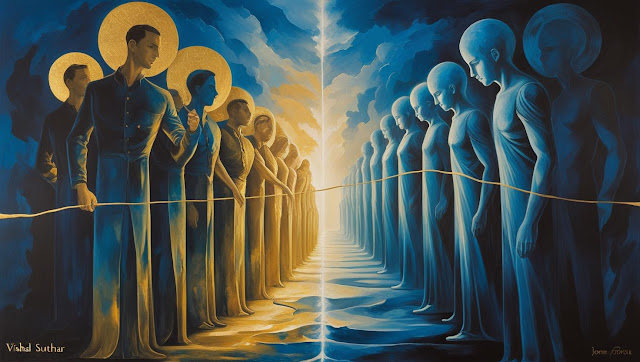WHATEVER WE WAIT FOR, IT ALWAYS COMES LATE ??
"Whatever We Wait for, It Always Comes Late??"
~ Vishal Suthar
🌱 Why Does What We Eagerly Wait for Always Arrive Late?
At some point in life, we’ve all felt it the exasperating stretch of time when we’re waiting for something deeply desired: a long-awaited call, a long-overdue opportunity, or the results of our efforts. And more often than not, it feels as if these awaited moments arrive painfully late. But is it the event that is delayed, or is it our psychological perception that distorts the passage of time?
Let’s delve into the emotional architecture behind this universally relatable phenomenon.
🌱 The Psychology of Waiting and Time Perception
Time, in its purest form, is impartial it flows uniformly, unaffected by emotions or expectations. But human consciousness doesn't perceive time in its objective essence. Instead, our mental and emotional states manipulate its flow.
When anticipation consumes us, time appears to decelerate. Each second stretches, moments feel stagnant, and the wait becomes emotionally exhausting. Conversely, when we are engrossed or distracted, time seems to race by as though it has wings.
This psychological distortion is a product of emotional investment and expectation density. The more we care, the longer we feel we’re waiting.
🌱 What Does Psychology Say?
This phenomenon is formally referred to as "Time Perception Bias." It occurs when our subjective experience of time diverges from its objective measure. When we are anxious, hopeful, or emotionally charged, our brain fixates on the desired outcome, often replaying anxious thoughts like:
"Why hasn't it happened yet?"
"What if something went wrong?"
"When will it finally occur?"
These repetitive ruminations amplify the psychological weight of time, making a short wait feel like an eternity.
🌱 Real-Life Examples
Take, for example, a student awaiting exam results. If they’ve worked diligently, they become emotionally invested in the outcome and count every day with growing intensity. The wait feels longer, heavier. In contrast, someone who was less invested in the exam might experience the result day as just another moment in time unanticipated, even abrupt.
Another common instance: waiting for a birthday call from a loved one. The anticipation makes every hour feel like a test of patience. If the call never comes, disappointment sets in. Ironically, if that same call arrives unexpectedly on another day, it brings spontaneous joy instead of frustration.
🌱 The Interplay of Expectation and Disappointment
Human nature is intricately tied to expectation. And wherever expectation resides, so too does restlessness. When what we await doesn't arrive on our mental timeline, dissatisfaction often takes root.
But often, the delay is not real it's perceived. The awaited moment arrives exactly when it is meant to, but our emotional over-attachment cloaks it in the illusion of lateness.
🌱 Is There a Solution?
So, should we abandon hope and stop waiting altogether? Absolutely not. Hope and desire are intrinsic to growth. However, what we can do is reframe how we approach waiting:
1. View Waiting as a Process, Not a Punishment
Waiting is not a sentence; it's a psychological phase. The more calm and composed we remain, the faster it seems to pass.
2. Keep Yourself Constructively Occupied
Engaging in meaningful tasks diverts attention away from anticipation and helps preserve emotional balance.
3. Understand That Timing Is Inherent to Everything
Just as fruit takes time to ripen and seasons follow their natural order, life unfolds in its own rhythm. Some things cannot and should not be rushed.
4. Cultivate Acceptance
Not everything is within our control. Waiting can be an opportunity to practice surrender and build emotional resilience.
🌱 In Conclusion
"Whatever we wait for, it always comes late" is not an absolute truth, but rather a reflection of our internal turmoil. Time remains constant; it is our expectation, attachment, and impatience that manipulates its feel.
The art of waiting lies in embracing the journey not just longing for the destination. When we learn to wait with grace, patience transforms into a powerful inner experience, not an emotional burden.
What’s your perspective?
Have you ever experienced this sensation of extended waiting? Share your thoughts in the comments your story might resonate with someone else’s.







.jpg)

Comments
Post a Comment